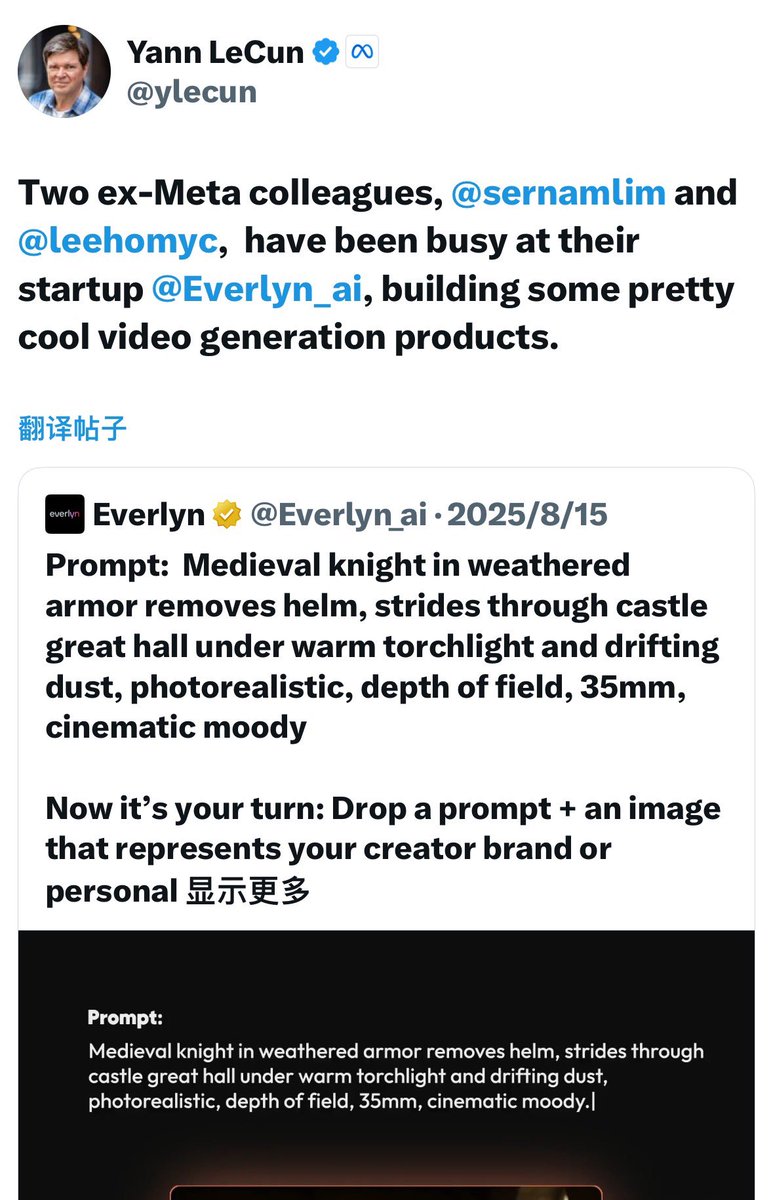Explosive: Turing Award winner and Meta's Chief AI Scientist, Yang Likun, officially announces joining @Everlyn_ai as an academic advisor.
Upon further investigation, it turns out that both the CEO and CTO of Everlyn previously held significant positions at Meta, and the three are former colleagues.
Everlyn CEO Sernam Lim: Professor of Computer Science at the University of Copenhagen, led the AI team at Meta for 6 years.
Everlyn CTO @leehomyc: Professor at the Hong Kong University of Science and Technology, main author of Make-a-Video (a groundbreaking AI text-to-video system from Meta AI in 2022).
Given that Everlyn is currently conducting a public offering on Kaito Capital Launchpad, the most pressing question for everyone is: Is it really worth a launch valuation of $250 million?
We will observe from two perspectives:
1/ Everlyn's Vision
Everlyn's technological ambition is indeed significant. As "the world's first AI video foundational model and super-intelligent multimodal ecosystem," Lyn attempts to redefine the rules of the video AI game through an open-source approach.
The core technological architecture can be divided into:
Foundational Model Layer - Everlyn-1
This is the technical foundation of the entire ecosystem. Compared to existing closed-source models, Lyn claims it can reduce costs by 10 times.
Application Layer - Everworld Platform
This is the video creation engine that users directly interact with. The core selling point is "personalized and interactive video agents" - generating video responses that mimic the user's appearance and behavior using just a photo or video of the user.
Decentralized Protocol Layer
The most interesting part of Lyn. Through the V-API network and the $LYN token, it has built a decentralized video generation infrastructure.
2/ Valuation Benchmarking
According to financing information, Everlyn raised $15 million in its seed round, with a valuation of $250 million. This valuation is not outrageous within the AI protocol space.
Benchmark projects include:
• Render Network (RNDR): Decentralized GPU rendering, market cap around $3 billion.
• Theta Network: Decentralized video streaming network, market cap around $1.5 billion.
• Bittensor (TAO): Decentralized AI training, peak market cap exceeding $14 billion.
It is important to note that Lyn is still in the early stages, and the product has not yet fully materialized. The $250 million valuation is more like a "acquisition premium" for a top-tier AI team—team members come from giants like Google, Meta, and Microsoft, and have participated in the development of important projects like Video Poet and Make-a-Video.
In the current AI talent competition, this technological alpha is indeed worth the price.
More importantly, the background of the investors. Mysten Labs (Sui team) leads the investment, with participants including Baseline, Selini Capital, Aethir Cloud, http://io.net, etc. These are institutions and teams with deep layouts in infrastructure and AI. Their investment logic often focuses on long-term bets on technological trends rather than short-term arbitrage.
The project risks mainly come from three aspects:
Technical implementation difficulty: Decentralized AI video generation looks great in theory, but faces huge challenges in practice. Quality control, latency optimization, cost control—each step is a tough nut to crack.
Intense market competition: Products like OpenAI's Sora and Google's Video Poet are ahead in terms of technological maturity and user recognition.
However, the opportunities are equally evident:
Open-source trend: The AI field is undergoing a shift from closed-source to open-source, with the success of open-source models like Llama and Stable Diffusion proving the feasibility of this path.
Market demand: The demand for video content creation is exploding, and the high barriers and costs of traditional tools leave significant space for new players.
Mature Web3 infrastructure: Decentralized computing, storage, incentive mechanisms, and other infrastructures are becoming increasingly refined, providing better soil for projects like Everlyn.
If I were to conclude, I would say that from the perspectives of vision, team, and current implementation, Everlyn is indeed worth a valuation of $250 million. Although this valuation reflects more of a future expectation rather than the current fundamentals.
Finally, a summary of Everlyn's public offering terms:
$250 million FDV (starting line with institutional round)
Up to 50% Bonus
100% unlock at TGE
This terms design is relatively friendly to retail investors, but it also means that there may be significant selling pressure at the opening. It is recommended that everyone participate rationally and do your own research.

免责声明:本文章仅代表作者个人观点,不代表本平台的立场和观点。本文章仅供信息分享,不构成对任何人的任何投资建议。用户与作者之间的任何争议,与本平台无关。如网页中刊载的文章或图片涉及侵权,请提供相关的权利证明和身份证明发送邮件到support@aicoin.com,本平台相关工作人员将会进行核查。




